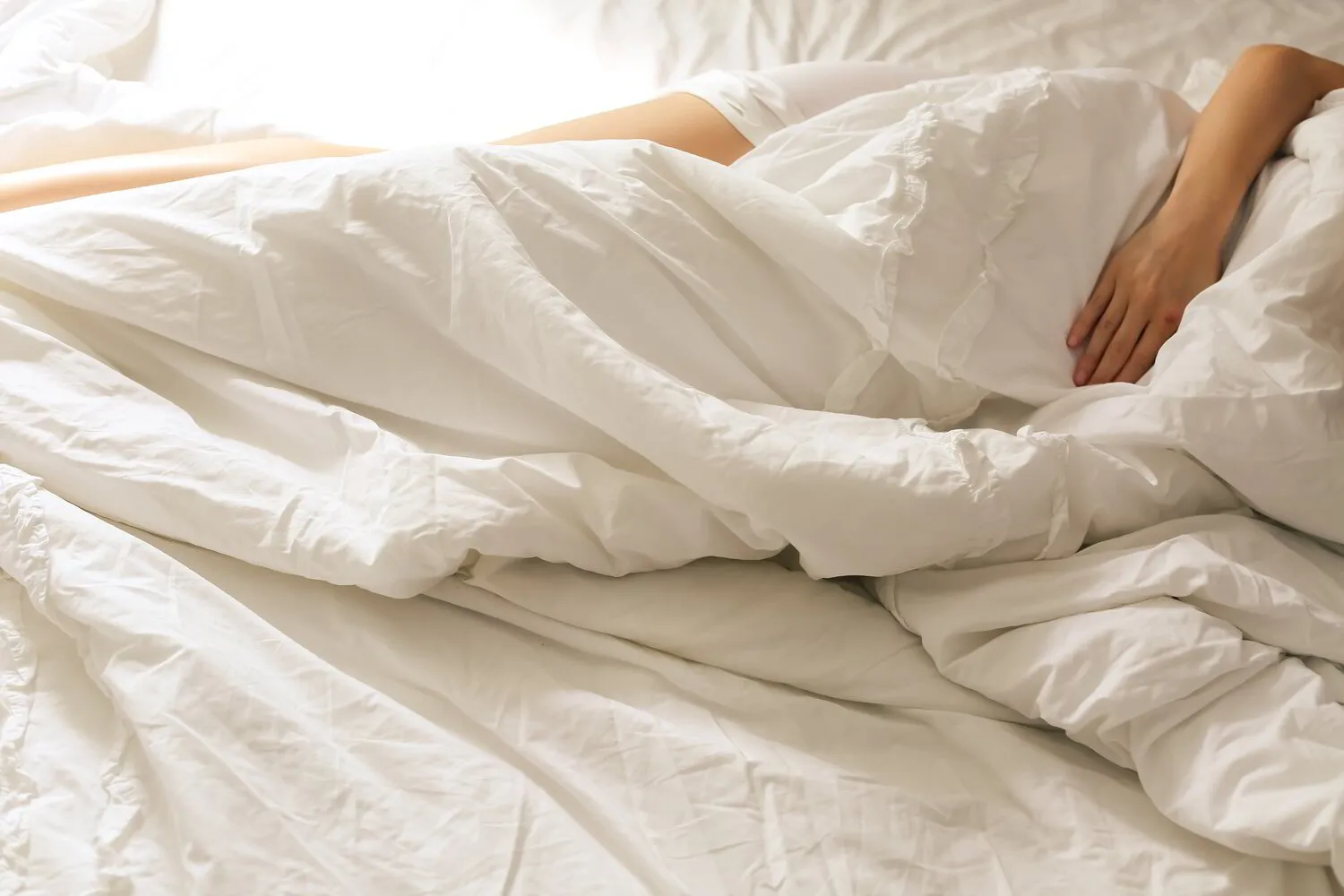Most of us probably view lack of sleep as an unfortunate reality to leading a busy life, but getting enough sleep isn’t optional if you want to be at optimum health.
A good night’s rest has so many benefits. It boosts your metabolism, reduces inflammation, clears your mind for the day ahead, fights aging, and more.
There are plenty of actionable steps you can take to increase the amount of sleep you’re getting and improve your sleep quality. But first, I want to share what actually happens to your body while you’re sleeping.
WHEN YOU SLEEP, YOUR BODY GOES TO WORK
There are four different stages of sleep, and Stage Three is the deepest. During this stage of restorative sleep, your blood pressure drops, breathing slows, and your blood flow moves toward your muscles and tissues to repair them while your brain gets cleaned up.
What do I mean by “cleaned up?” Your neurons shrink to create room for microglia cells, which are like garbage trucks that come to clear space after the day’s work. The more cognitive activity you engage in by day, the more byproduct, or waste, needs to be cleaned up by night. This action quite literally clears your mind so you can start fresh the next day.
However, when you don’t get enough sleep, your brain doesn’t function as well because the cleaning process hasn’t finished.
While the neurons are resting in their shrunken state, other things are happening. In Stage Three sleep, all of your critical short-term memories from the day are moved to your long-term memory. These quick bursts of activity—where neurons are transferred from your hypothalamus to different parts of your brain—are known as sleep spindles.
During this time, your neurons get rid of information they don’t need. Sometimes, during REM Sleep, you have vivid dreams with realistic components because your brain is processing whether or not you had an emotional attachment to a cognitive experience. It’s fascinating that our body can sort all this out while we’re sleeping, right?
WHAT HAPPENS WHEN YOU’RE SLEEP-DEPRIVED
Depriving your body of necessary sleep can lead to some severe health issues.
Less sleep puts your body in a more stressed out state, which requires your cortisol to over-activate, which affects your metabolism. This can result in blood sugar imbalance, chronic stress, increased appetite, heart disease, diabetes, pregnancy issues, and hormone imbalances.
Newer research shows that lack of sleep can lead to obesity and metabolic syndromes such as high blood pressure because your ghrelin hormone (also known as the hunger hormone) will be more prominent during the day. That’s partly because while you’re sleeping, the lymphatic system is also being cleaned out, with fragments being dumped into your liver for processing before leaving through your exit routes. If you’re not getting enough sleep, your body is not getting rid of waste and toxins properly.
UNDERSTANDING SLEEP RHYTHMS
Your body knows when it’s time to be awake and alert and when it’s time to rest, so the trick is to allow the body to function properly during these times and not fight against its natural rhythm.
Your body produces a higher rate of cortisol in the morning and a higher rate of melatonin at night, which creates our sleep-wake cycle. As I mentioned in my last blog post, cortisol regulates your blood sugar levels, stress response, metabolism, and inflammation. Melatonin helps the body detect darkness and helps induce sleep, while also acting as an antioxidant and regulatory hormone for menstrual cycles.
If you feel like you can’t get to sleep at night, it could mean that the balance is off between these two hormones.
SLEEP AND MENTAL HEALTH
Your mental health has a massive impact on your quality of sleep and vice versa.
If you are experiencing anxiety, you may find it very difficult to sleep because of racing thoughts. Depression may cause you to oversleep, which comes with its own set of complications.
Some mental health experiences can be a direct result of physical imbalances, such as nutrient deficiencies or hypothyroidism. I strongly suggest working with a doctor to help you find the root cause. If it’s not physical, then counseling, medication, and lifestyle changes can help.
HOW MUCH SLEEP DO YOU NEED?
Adults need at least seven—preferably eight—hours of sleep every night. Children and teens need more, and seniors tend to need less. If you experience chronic illness, such as digestive issues, you’ll likely need more sleep to recover from increased inflammation.
The real sweet spot for most adults, though, is 7.5 hours. That’s because your sleep cycles last 90 minutes on average, and every 90 minutes, we are cycling through sleep. If you can get through five sleep stages, it’s the most protective against aging. Even if you feel great on 6.5 hours of sleep, strive for longer, otherwise you may have a higher chance of contracting age-related diseases or cognitive issues later on.
HOW MUCH SLEEP DO YOU NEED?
Adults need at least seven—preferably eight—hours of sleep every night. Children and teens need more, and seniors tend to need less. If you experience chronic illness, such as digestive issues, you’ll likely need more sleep to recover from increased inflammation.
The real sweet spot for most adults, though, is 7.5 hours. That’s because your sleep cycles last 90 minutes on average, and every 90 minutes, we are cycling through sleep. If you can get through five sleep stages, it’s the most protective against aging. Even if you feel great on 6.5 hours of sleep, strive for longer, otherwise you may have a higher chance of contracting age-related diseases or cognitive issues later on.
HOW TO GET BETTER SLEEP
If you have trouble sleeping and it is not related to mental health issues or hormone imbalances, chances are you’re overactive in the evening, or you don’t have a structured sleep regimen.
Here are a few top things you can do to improve your quality of sleep:
- Go to bed and wake up around the same time every day.
- Curb your caffeine intake. (No coffee after 3 pm!)
- Don’t drink alcohol or eat sugar before bed.
- Don’t exercise intensively after 6 pm.
- Stop working a few hours before bed.
- Don’t use electronics late at night. If you do, use blue-light-blocking glasses and dim your screen.
- Dim the lights a few hours before bed. (Candlelight works well, too!)
- Put your electronics in another room when you sleep or set them on airplane mode.
- Turn off your WiFi before bed.
- Keep your sleeping environment completely dark.
- Reserve your bedroom for sleep and sex only. (That means no doubling as an office!)
- Keep your bedroom chilly, preferably around 68 degrees.
- Use comfortable sheets and pillows.
- Wake up earlier and welcome natural sunlight into your home.
- Do a light morning exercise. (Bonus if it’s outdoors!)
HOW HERBS & SUPPLEMENTS CAN HELP
Supplements can also help get you to sleep properly. I recommend magnesium glycinate to calm the body in the evening. Additionally, phosphorylated serine can modulate your cortisol production.
Melatonin can actually disrupt your sleep if you take too much. You have to pay attention to how this one makes you feel. If you fall asleep fine but wake up in the middle of the night or groggy the next day, try 1-300 milligrams of 5-HTP 30-45 minutes before instead. 5-HTP can help you create your own production of melatonin.
Certain herbs can also help you relax. Valerian root, skullcap, and passionflower are all great for calming overactive thoughts in the evening.
Want a custom plan to improve your quality of sleep? Book a one-hour telehealth visit with me here.

